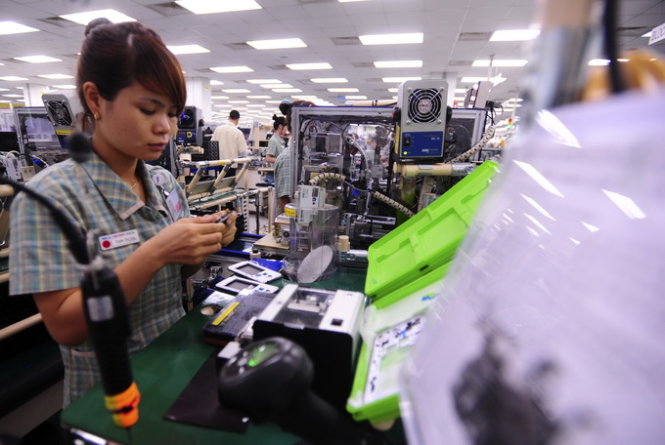Samsung CE Complex Electronics Co. Ltd. (SECC), a subsidiary of South Korean-based Samsung Electronics Corp., is seeking permission from Vietnamese authorities to exempt it from several taxes worth over $15.5 million.
The tax incentive appeal was mentioned in a letter sent to the Prime Minister and relevant state agencies earlier this week, with the direct beneficiary being the $1.4 billion Samsung CE Complex in the Saigon Hi-Tech Park (SHTP) located in District 9, Ho Chi Minh City.
Among the proposed tax incentives for that facility are those going beyond the provisions of current law.
Samsung has mooted three main incentives for the project, including import duty exemption for construction materials which have to be imported for the establishment of the plant.
Its proposition also covers the import duty exemption for imported raw materials, supplies, and components for production within five years from the date the plant opens, or when all the tariffs on those imported items are eliminated completely once the ASEAN Trade in Goods Agreement (ATIGA) takes full effect.
ATIGA, a free trade agreement signed by member countries under the Association of Southeast Asian Nations (ASEAN) in 2010, will cut or exempt thousands of import tariff lines for tens of thousands of items produced and traded within the ASEAN by 2018.
Many tariffs have been either lifted or lowered when the ASEAN countries trade with one another since the beginning of this year.
SECC also seeks priority in handling customs procedures.
The first incentive results from the fact that local products cannot meet the standard requirements of Samsung, and a list of imported items needed for the construction of the plant was also enclosed, SECC said in the letter.
SECC added that the progress on construction of the plant is now very urgent, and the demand for construction materials, which cannot be supplied domestically, is rising fast. Samsung wants to be proactive in the supply sources and schedule for quality raw materials.
The second incentive is said to be due to the fact that the SECC project is a large-scale investment for which the disbursement will be done within five years.
Therefore, the project will face certain risks during the process, including the cost of fixed assets depreciation at $700 million and low productivity, which is expected not to achieve optimal rates when the plant begins to run.
For these reasons, in the first five-year period, SECC will face many difficulties and will not be able to compete on price, Samsung said, further explaining that import tax exemption for components and materials in the initial stage will help remove those difficulties and enable the project to develop,.
However, the proposed tax incentives by Samsung also include many items that will be produced at the plant and are not electrical appliances that require high-tech in production, as per Government Decree No. 87/2010/ND-CP.
Many products to be made at the Samsung CE Complex, such as air conditioners and refrigerators, are not on the list of components, materials and supplies enjoying preferential duty-free import, as stipulated by the decree taking effect in 2010.
However, SECC said the most advanced technologies will be applied in the manufacture of those consumer electronics products.
Samsung also discussed the enormous benefits that the project will bring.
Specifically, when the company enters the stage of stable production, its annual revenue will be $6 billion per year.
Samsung estimates the total import duty exemption, as proposed, for raw materials and construction materials at $8 million, and for components and materials for production in the first stage at $7.5 million after ATIGA takes full effect in 2018.
Thus, the total import duty exemption for the proposed project is estimated at $15.5 million, "an insignificant figure" compared to the benefits that the project will bring to Vietnam, said SECC.
|
SECC's plant, covering 70 hectares at SHTP in District 9, was licensed on October 1, 2014 at the headquarters of Samsung Electronics Corporation in South Korea, with the presence of Nguyen Phu Trong, General Secretary of the Communist Party of Vietnam, and senior leaders of the electronics giant. The main products to be produced at the Ho Chi Minh City plant will be consumer electronics products and household appliances such as high-tech televisions, computer monitors, printers, air conditioners, and refrigerators for both the domestic and international markets. As planned, construction work on the project will start in the first quarter of 2015 and the plant will go into operation in the second quarter of 2016. |
Like us on Facebook or follow us on Twitter to get the latest news about Vietnam!




















































